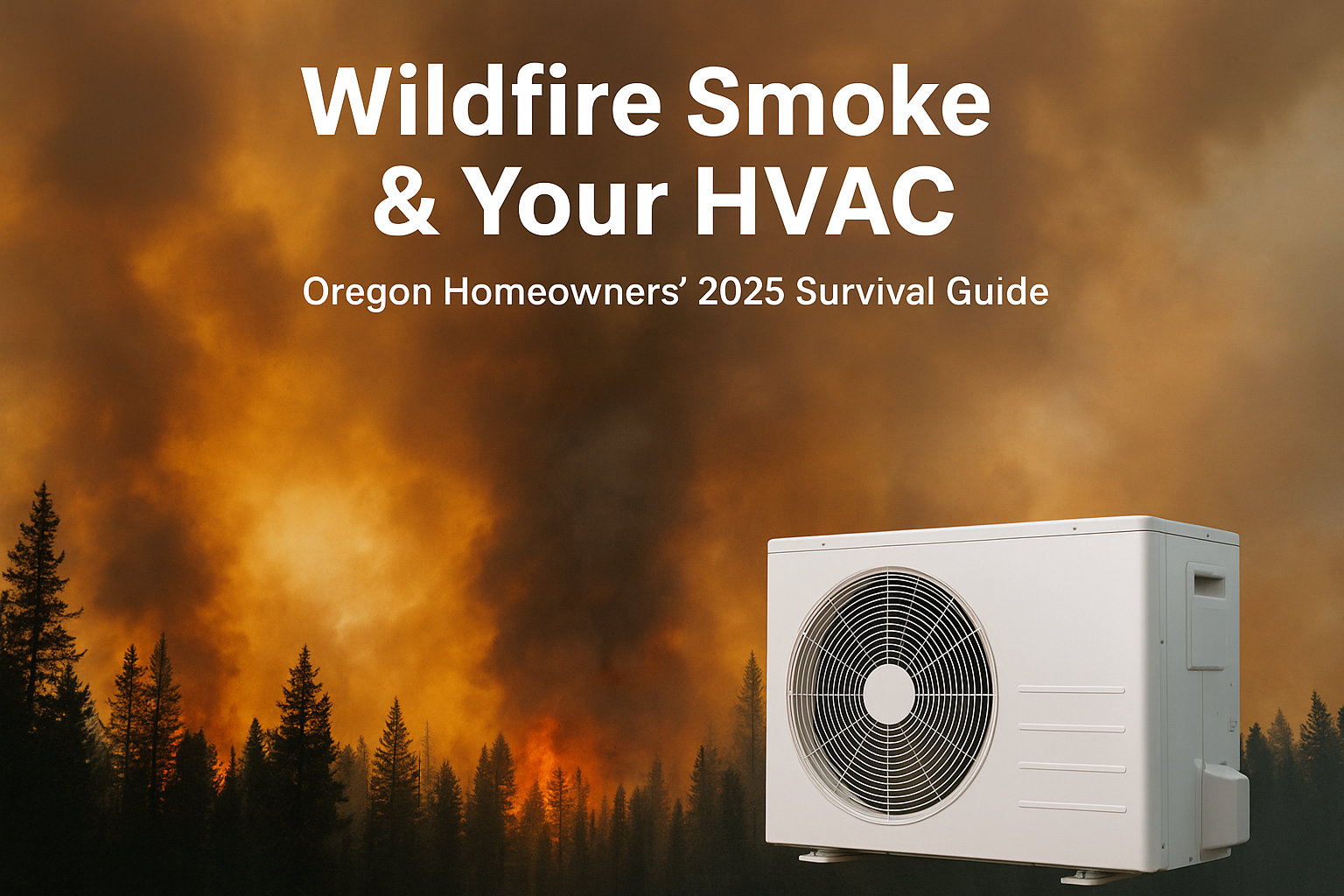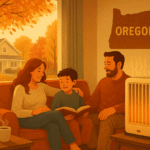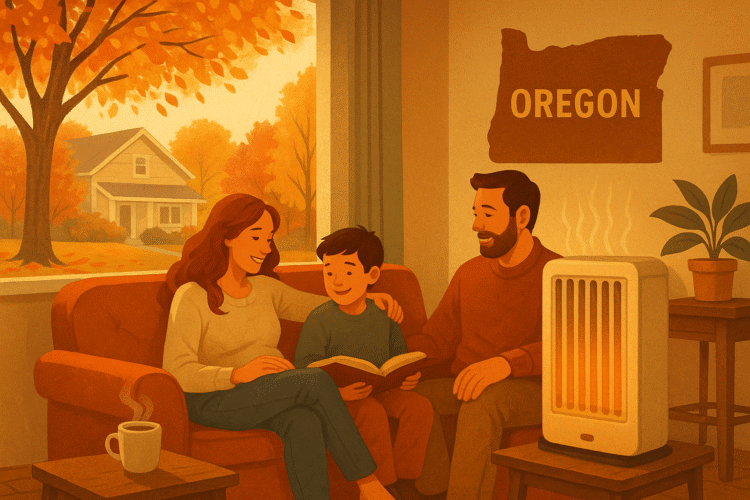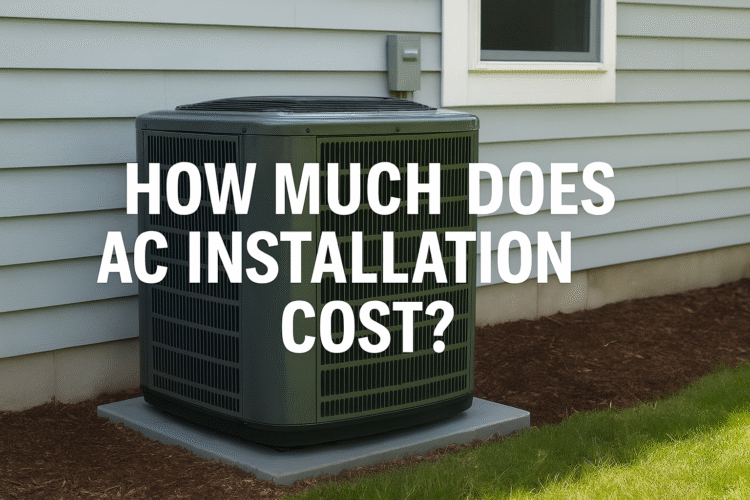
🏠 Wildfire Smoke & Your HVAC: Oregon Homeowners’ 2025 Survival Guide
Oregon wildfire smoke is an increasing threat for Oregon homeowners—especially right now. The Flat Fire in Central Oregon has already burned more than 21,900 acres with zero containment, and according to OPB’s wildfire coverage, thousands of homes remain under threat as air quality plunges into “unhealthy to very unhealthy” ranges. Air quality experts at IQAir warn that smoke intrusions can linger for weeks across Central Oregon and beyond.
The good news? Your HVAC system can be your biggest ally in keeping indoor air safe—if it’s properly prepared.
🔥 Why Wildfire Smoke is a Big Problem in Oregon
Wildfire smoke isn’t just irritating—it contains fine particulate matter (PM2.5) that can trigger asthma, allergies, and long-term respiratory issues. According to the EPA, PM2.5 particles are so small they lodge deep in your lungs.
The Oregon Department of Environmental Quality frequently issues air quality advisories during summer, and sites like OregonSmoke.org provide real-time updates and preparation tips for residents.
🌀 Step 1: Upgrade Your HVAC Filters
Not all filters are created equal. For wildfire smoke, you’ll want at least a MERV 13 filter or higher. These capture much smaller particles than the standard MERV 8 filters most homes use.
Recent research from Oregon State University found that mechanical media filters outperform charged filters in durability and smoke-capturing ability—making them the better choice during long smoke events.
Pro tip: Change your filter every 30 days during smoke season, even if it doesn’t look dirty.
🌬 Step 2: Seal & Protect Your Ductwork
Leaky ducts can draw in smoky outdoor air, defeating the purpose of filtration. Sealing ducts not only improves indoor air quality but also reduces energy waste.
Regular duct cleaning also helps prevent pollutants from circulating through your home’s system—learn more in our guide on why duct cleaning is important for your home.
👉 If you’re unsure about your ductwork’s condition, scheduling a duct inspection and sealing service can help keep smoke outside where it belongs.
🛑 Step 3: Use “Recirculation Mode”
During smoky days, avoid pulling in outside air. Set your HVAC system or thermostat to “recirculate” or “closed vent” mode. This way, you’re re-filtering your indoor air instead of introducing more pollution.
The Energy Trust of Oregon recommends running your fan continuously on smoky days to keep filtering the air without introducing outside contaminants.
🧼 Step 4: Don’t Forget Maintenance
A dirty HVAC system struggles to filter smoke effectively. Annual professional maintenance ensures your blower motor, coils, and ducts are clean and working efficiently.
The OSU Extension Service also suggests creating a designated “clean room” in your home, ideally with a portable HEPA purifier, for days when outdoor smoke is heaviest.
🛡 Step 5: Indoor Best Practices
- Avoid burning candles, frying food, or using gas stoves during smoky periods.
- Keep windows and doors tightly sealed.
- Wipe shoes and clothing before entering after being outdoors in smoky conditions.
The EPA’s clean room guide is a great step-by-step resource for households in wildfire zones.
❓ FAQ: HVAC & Wildfire Smoke in Oregon
1. Do standard HVAC filters block wildfire smoke?
No. Standard filters (MERV 8) capture dust and pollen but allow fine smoke particles to pass through. You’ll need MERV 13+ for smoke protection.
2. Is it safe to run my AC during wildfire smoke?
Yes, but keep it on recirculation mode to avoid pulling in outdoor air. Also, change filters more often during heavy smoke events.
3. How can I tell if smoke is leaking into my ductwork?
If your home smells smoky even with windows shut, you may have leaky ducts. Professional sealing fixes this problem.
4. Should I invest in an air purifier if I already have HVAC?
Yes—especially if someone in your household has asthma or allergies. Air purifiers and HVAC filters work best together.
5. What’s the best way to prepare my system for smoke season?
Book a professional duct cleaning and inspection before July. This ensures your system is optimized and free of dust that could worsen indoor air quality.
✅ Final Word
Wildfire smoke is becoming a reality of Oregon summers. With better filters, sealed ductwork, and timely maintenance, your HVAC system can protect your family’s health all season long.
👉 Ready to prepare your home for wildfire smoke season? Schedule a duct inspection with The Duct Guys today and breathe easier tomorrow.






